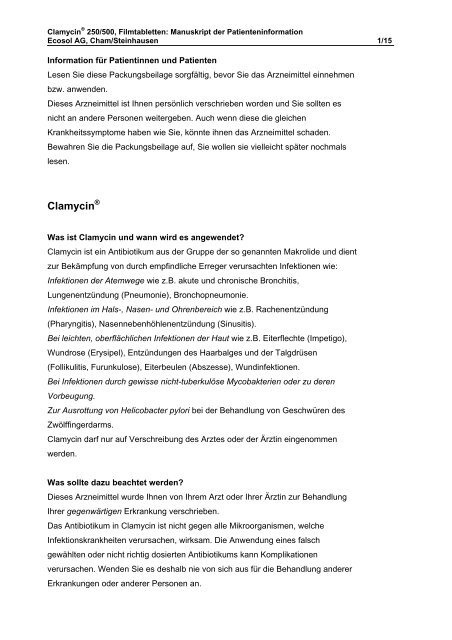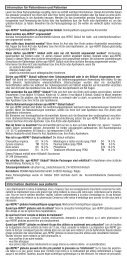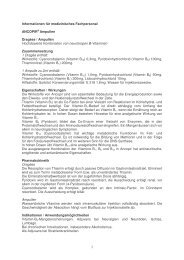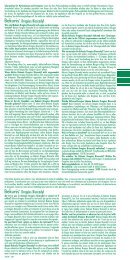Clamycin
Clamycin
Clamycin
You also want an ePaper? Increase the reach of your titles
YUMPU automatically turns print PDFs into web optimized ePapers that Google loves.
<strong>Clamycin</strong> ® 250/500, Filmtabletten: Manuskript der Patienteninformation<br />
Ecosol AG, Cham/Steinhausen 1/15<br />
Information für Patientinnen und Patienten<br />
Lesen Sie diese Packungsbeilage sorgfältig, bevor Sie das Arzneimittel einnehmen<br />
bzw. anwenden.<br />
Dieses Arzneimittel ist Ihnen persönlich verschrieben worden und Sie sollten es<br />
nicht an andere Personen weitergeben. Auch wenn diese die gleichen<br />
Krankheitssymptome haben wie Sie, könnte ihnen das Arzneimittel schaden.<br />
Bewahren Sie die Packungsbeilage auf, Sie wollen sie vielleicht später nochmals<br />
lesen.<br />
<strong>Clamycin</strong> ®<br />
Was ist <strong>Clamycin</strong> und wann wird es angewendet?<br />
<strong>Clamycin</strong> ist ein Antibiotikum aus der Gruppe der so genannten Makrolide und dient<br />
zur Bekämpfung von durch empfindliche Erreger verursachten Infektionen wie:<br />
Infektionen der Atemwege wie z.B. akute und chronische Bronchitis,<br />
Lungenentzündung (Pneumonie), Bronchopneumonie.<br />
Infektionen im Hals-, Nasen- und Ohrenbereich wie z.B. Rachenentzündung<br />
(Pharyngitis), Nasennebenhöhlenentzündung (Sinusitis).<br />
Bei leichten, oberflächlichen Infektionen der Haut wie z.B. Eiterflechte (Impetigo),<br />
Wundrose (Erysipel), Entzündungen des Haarbalges und der Talgdrüsen<br />
(Follikulitis, Furunkulose), Eiterbeulen (Abszesse), Wundinfektionen.<br />
Bei Infektionen durch gewisse nicht-tuberkulöse Mycobakterien oder zu deren<br />
Vorbeugung.<br />
Zur Ausrottung von Helicobacter pylori bei der Behandlung von Geschwüren des<br />
Zwölffingerdarms.<br />
<strong>Clamycin</strong> darf nur auf Verschreibung des Arztes oder der Ärztin eingenommen<br />
werden.<br />
Was sollte dazu beachtet werden?<br />
Dieses Arzneimittel wurde Ihnen von Ihrem Arzt oder Ihrer Ärztin zur Behandlung<br />
Ihrer gegenwärtigen Erkrankung verschrieben.<br />
Das Antibiotikum in <strong>Clamycin</strong> ist nicht gegen alle Mikroorganismen, welche<br />
Infektionskrankheiten verursachen, wirksam. Die Anwendung eines falsch<br />
gewählten oder nicht richtig dosierten Antibiotikums kann Komplikationen<br />
verursachen. Wenden Sie es deshalb nie von sich aus für die Behandlung anderer<br />
Erkrankungen oder anderer Personen an.
<strong>Clamycin</strong> ® 250/500, Filmtabletten: Manuskript der Patienteninformation<br />
Ecosol AG, Cham/Steinhausen 2/15<br />
Wann darf <strong>Clamycin</strong> nicht angewendet werden?<br />
<strong>Clamycin</strong> sollte bei bekannter oder vermuteter Überempfindlichkeit auf so genannte<br />
Makrolid-Antibiotika, wie z.B. Clarithromycin oder Erythromycin oder einen der<br />
Inhaltsstoffe von <strong>Clamycin</strong>, nicht eingenommen werden.<br />
<strong>Clamycin</strong> soll nicht gleichzeitig mit Mitteln zur Förderung der Magen-Darm-Tätigkeit<br />
(mit dem Wirkstoff Cisaprid), Neuroleptika (mit dem Wirkstoff Pimozid) oder Mitteln<br />
gegen Allergie (mit den Wirkstoffen Astemizol und Terfenadin) eingenommen<br />
werden.<br />
Wann ist bei der Einnahme von <strong>Clamycin</strong> Vorsicht geboten?<br />
Informieren Sie den behandelnden Arzt resp. Ärztin, falls Sie ein Leber- oder<br />
Nierenleiden haben.<br />
Einige andere Arzneimittel können mit <strong>Clamycin</strong> Wechselwirkungen haben.<br />
Informieren Sie deshalb Ihren Arzt oder Ihre Ärztin, falls Sie z.B. Arzneimittel<br />
- gegen Asthma (Wirkstoffe: Aminophyllin, Theophyllin);<br />
- gegen Epilepsie und Nervenschmerzen (Wirkstoffe: Carbamazepin, Phenytoin,<br />
Valproinsäure);<br />
- gegen Funktionsstörungen der Herzkranzgefässe (Wirkstoff: Digoxin);<br />
- gegen Herzrhythmusstörungen (Wirkstoffe: Chinidin, Disopyramid);<br />
- gegen Infektionen mit Mycobakterien (Wirkstoff: Rifabutin);<br />
- gegen die Vermehrung von Viren (Wirkstoff: Ritonavir);<br />
- gegen Migräne (Wirkstoffe: Ergotamin, Dihydroergotamin);<br />
- zur Beruhigung und zum Einschlafen (Wirkstoffe auf Benzodiazepinbasis:<br />
Alprazolam, Midazolam, Triazolam, Hexobarbital);<br />
- gegen Hautenzündungen (Wirkstoff: Methylprednisolon);<br />
- gegen Potenzstörungen (Wirkstoff: Sildenafil);<br />
- gegen Krebs (Wirkstoff: Vinblastin);<br />
- gegen gynäkologische Leiden und Parkinson'sche Krankheit (Wirkstoff:<br />
Bromocriptin);<br />
- gegen Durchblutungsstörungen in den Beinen (Wirkstoff: Cilostazol);<br />
- zur Blutverdünnung;<br />
- zur Senkung von erhöhten Blutfetten (Wirkstoffe: Simvastatin und Lovastatin);<br />
- zur Unterdrückung des Immunsystems (Wirkstoffe: Ciclosporin, Tacrolimus)<br />
einnehmen.<br />
Der Arzt bzw. die Ärztin wird die Dosierung der Arzneimittel überprüfen.<br />
Informieren Sie umgehend den Arzt bzw. die Ärztin, wenn während oder nach der<br />
Behandlung mit <strong>Clamycin</strong> schwere und anhaltende Durchfälle auftreten.
<strong>Clamycin</strong> ® 250/500, Filmtabletten: Manuskript der Patienteninformation<br />
Ecosol AG, Cham/Steinhausen 3/15<br />
Auf Grund der möglichen Nebenwirkungen kann dieses Arzneimittel die<br />
Reaktionsfähigkeit, die Fahrtüchtigkeit und Fähigkeit, Werkzeuge oder Maschinen<br />
zu bedienen, beeinträchtigen.<br />
Informieren Sie Ihren Arzt oder Apotheker bzw. Ihre Ärztin oder Apothekerin, wenn<br />
Sie an anderen Krankheiten leiden, Allergien haben oder andere Arzneimittel (auch<br />
selbst gekaufte!) einnehmen oder äusserlich anwenden.<br />
Darf <strong>Clamycin</strong> während der Schwangerschaft oder in der Stillzeit<br />
eingenommen werden?<br />
Wenn Sie schwanger sind oder es werden möchten oder falls Sie stillen, sollte<br />
<strong>Clamycin</strong> nur auf ausdrückliche Anweisung Ihres darüber informierten Arztes oder<br />
Apothekers bzw. Ihrer Ärztin oder Apothekerin eingenommen werden.<br />
Wie verwenden Sie <strong>Clamycin</strong>?<br />
<strong>Clamycin</strong> muss gemäss den Anweisungen Ihres Arztes bzw. Ihrer Ärztin<br />
eingenommen werden.<br />
Die übliche Tagesdosis für Erwachsene und Jugendliche älter als 12 Jahre beträgt<br />
2× 1 Filmtablette zu 250 mg (= 500 mg) welche jeweils am Morgen und am Abend<br />
eingenommen werden sollte. Diese Dosierung kann gegebenenfalls von Ihrem Arzt<br />
bzw. Ihrer Ärztin erhöht werden.<br />
Für Infektionen durch nicht-tuberkulöse Mycobakterien ist die empfohlene Dosierung<br />
zur Behandlung und zur Vorbeugung 2× 1 Filmtablette zu 500 mg pro Tag (= 1000<br />
mg).<br />
Für die Ausrottung von Helicobacter pylori beträgt die empfohlene Dosierung 2× 1<br />
Filmtablette zu 500 mg (= 1000 mg) <strong>Clamycin</strong> pro Tag, zusammen mit Amoxicillin<br />
2× 1000 mg pro Tag und Omeprazol 1-2× 20 mg pro Tag während 7-10 Tagen.<br />
Dauer der Behandlung<br />
Die Behandlungsdauer beträgt üblicherweise 7-14 Tage. Je nach Art Ihrer Krankheit<br />
kann Ihr Arzt bzw. Ihre Ärztin <strong>Clamycin</strong> evtl. auch für längere Zeit verschreiben. Dies<br />
ist besonders der Fall bei Infektionen durch nicht-tuberkulöse Mycobakterien.<br />
<strong>Clamycin</strong> Filmtabletten sind zur Behandlung von Kindern unter 12 Jahren nicht<br />
geeignet.<br />
Eine begonnene Antibiotika-Therapie sollte so lange wie vom Arzt oder der Ärztin<br />
verordnet, durchgeführt werden. Die Krankheitssymptome verschwinden oft, bevor<br />
die Infektion vollständig ausgeheilt ist. Eine ungenügende Anwendungsdauer oder<br />
ein zu frühes Beenden der Behandlung kann ein erneutes Aufflammen der<br />
Erkrankung zur Folge haben.
<strong>Clamycin</strong> ® 250/500, Filmtabletten: Manuskript der Patienteninformation<br />
Ecosol AG, Cham/Steinhausen 4/15<br />
<strong>Clamycin</strong> ist unzerkaut einzunehmen. Es kann unabhängig von Mahlzeiten, d.h.<br />
entweder auf leeren Magen oder zum Essen eingenommen werden.<br />
Ändern Sie nicht von sich aus die verschriebene Dosierung. Wenn Sie glauben, das<br />
Arzneimittel wirke zu schwach oder zu stark, so sprechen Sie mit Ihrem Arzt oder<br />
Apotheker bzw. mit Ihrer Ärztin oder Apothekerin.<br />
Welche Nebenwirkungen kann <strong>Clamycin</strong> haben?<br />
Folgende Nebenwirkungen können bei der Einnahme von <strong>Clamycin</strong> auftreten:<br />
Als Begleiterscheinungen können gelegentlich Symptome im Magen-Darmbereich<br />
wie Übelkeit, Erbrechen, Druckgefühl im Oberbauch (in seltenen Fällen krampfartig),<br />
weiche Stühle und Durchfall, Geschmacksstörungen, Geruchsstörungen sowie<br />
reversible Zungen- und Zahnverfärbungen (vor allem unter<br />
Kombinationsbehandlung mit Omeprazol, meist dunkelbraun bis schwarz) auftreten.<br />
Informieren Sie umgehend Ihren Arzt oder Ihre Ärztin, wenn während oder nach der<br />
Behandlung mit <strong>Clamycin</strong> schwere und anhaltende Durchfälle auftreten.<br />
Informieren Sie Ihren Arzt bzw. Ihre Ärztin, falls Sie in Ihrem Mund weissliche<br />
Beläge entdecken oder wenn die Mundschleimhaut oder die Zunge entzündet ist.<br />
Selten wurde über Hautausschläge und Juckreiz berichtet. Selten sind schwere<br />
allergische Reaktionen beobachtet worden. Wenden Sie sich sofort an Ihren Arzt<br />
oder Ihre Ärztin, falls allergische Symptome wie Hautausschläge, Gesichtsödem<br />
oder Atemnot auftreten.<br />
Wie ähnliche Präparate, wurde auch <strong>Clamycin</strong> in seltenen Fällen mit Störungen der<br />
Leber-, Bauchspeicheldrüsen- oder Nierenfunktion in Verbindung gebracht.<br />
Konsultieren Sie den Arzt bzw. die Ärztin, wenn Bauchschmerzen, Appetitlosigkeit,<br />
Müdigkeit oder eine Gelbverfärbung der Haut auftreten.<br />
Ebenfalls können Kopfschmerzen und Hörstörungen mit vorübergehendem<br />
teilweisem Hörverlust, selten Unruhe, Benommenheit, Schwindel, Ohrenklingen,<br />
Angstzustände, Schlaflosigkeit, schlechte Träume, Verwirrtheit und Halluzinationen<br />
auftreten.<br />
Selten sind Krampfanfälle aufgetreten.<br />
Selten wurde ein Abfallen des Blutzuckers, auch unter gleichzeitiger Behandlung mit<br />
oralen Antidiabetika oder Insulin, beobachtet.<br />
Ebenfalls wurden selten Herzrhythmus-Störungen beobachtet.<br />
Bei Patientinnen und Patienten, die während längerer Zeit hohe Dosen des<br />
Arzneimittels einnehmen müssen, können eventuell folgende zusätzliche<br />
Nebenwirkungen auftreten: Blähungen, Verstopfung und trockener Mund.
<strong>Clamycin</strong> ® 250/500, Filmtabletten: Manuskript der Patienteninformation<br />
Ecosol AG, Cham/Steinhausen 5/15<br />
Sollten unerwünschte Wirkungen länger andauern oder ernsterer Art sein (z.B.<br />
Durchfälle), so melden Sie dies Ihrem Arzt oder Apotheker bzw. Ihrer Ärztin oder<br />
Apothekerin.<br />
Falls weitere Nebenwirkungen auftreten, bei denen Sie einen Zusammenhang mit<br />
der Anwendung von <strong>Clamycin</strong> vermuten, sollten Sie unverzüglich Ihren Arzt oder<br />
Apotheker bzw. Ihre Ärztin oder Apothekerin konsultieren.<br />
Wenn Sie Nebenwirkungen bemerken, die hier nicht beschrieben sind, sollten Sie<br />
Ihren Arzt oder Apotheker bzw. Ihre Ärztin oder Apothekerin informieren.<br />
Was ist ferner zu beachten?<br />
<strong>Clamycin</strong> bei Raumtemperatur (15-25°C), in der verschlossenen Originalpackung,<br />
vor Licht geschützt und ausser Reichweite von Kindern lagern.<br />
<strong>Clamycin</strong> darf nur bis zu dem auf dem Behälter mit «Exp.» bezeichneten Datum<br />
verwendet werden.<br />
Nach Beendigung der Behandlung das Arzneimittel mit dem restlichen Inhalt Ihrer<br />
Abgabestelle (Arzt oder Apotheker bzw. Ärztin oder Apothekerin) zum<br />
fachgerechten Entsorgen bringen.<br />
Weitere Auskünfte erteilt Ihnen Ihr Arzt oder Apotheker bzw. Ihre Ärztin oder<br />
Apothekerin. Diese Personen verfügen über die ausführliche Fachinformation.<br />
Was ist in <strong>Clamycin</strong> enthalten?<br />
Eine Filmtablette enthält 250 mg bzw. 500 mg Clarithromycin als Wirkstoff und<br />
Hilfsstoffe.<br />
56'951 (Swissmedic)<br />
Wo erhalten Sie <strong>Clamycin</strong>? Welche Packungen sind erhältlich?<br />
In Apotheken gegen ärztliche Verschreibung, die nur zum einmaligen Bezug<br />
berechtigt.<br />
Packungen mit 14 und 20 Filmtabletten zu 250 mg.<br />
Packungen mit 14, 20 und 30 Filmtabletten zu 500 mg.<br />
Zulassungsinhaberin<br />
Ecosol AG, Cham/Steinhausen<br />
Diese Packungsbeilage wurde im August 2005 letztmals durch die<br />
Arzneimittelbehörde (Swissmedic) geprüft.
<strong>Clamycin</strong> ® 250/500, Filmtabletten: Manuskript der Patienteninformation<br />
Ecosol AG, Cham/Steinhausen 6/15<br />
Information destinée aux patients<br />
Lisez attentivement la notice d’emballage avant de prendre ou d’utiliser le<br />
médicament.<br />
Ce médicament vous a été remis sur ordonnance médicale. Ne le remettez donc<br />
pas à d’autres personnes, même si elles semblent présenter les mêmes symptômes<br />
que vous. En effet, ce médicament pourrait nuire à leur santé.<br />
Conservez cette notice d’emballage pour pouvoir la relire plus tard si nécessaire.<br />
<strong>Clamycin</strong> ®<br />
Qu'est-ce-que <strong>Clamycin</strong> et quand est-il utilisé?<br />
Le <strong>Clamycin</strong> est un antibiotique de la classe des macrolides, utilisé pour le<br />
traitement des infections dues à des germes sensibles telles que:<br />
Infections respiratoires telles que p.ex. bronchite aiguë et chronique, pneumonie,<br />
broncho-pneumonie.<br />
Infections de la gorge, du nez et des oreilles telles que p.ex. pharyngite, sinusite.<br />
Infections superficielles légères de la peau telles que p.ex. impétigo, érysipèle,<br />
infections du follicule pileux et des glandes sébacées (folliculite, furonculose),<br />
abcès, plaies infectées.<br />
Infections dues à certaines mycobactéries non tuberculeuses ou la prévention de<br />
ces infections.<br />
Pour éradiquer d'helicobacter pylori lors du traitement d'un ulcère du duodénum.<br />
Le <strong>Clamycin</strong> ne doit être pris que sur prescription médicale.<br />
De quoi faut-il tenir compte en dehors du traitement?<br />
Ce médicament vous a été prescrit par votre médecin pour le traitement de votre<br />
maladie actuelle.<br />
L'antibiotique contenu dans le <strong>Clamycin</strong> n'est pas efficace vis-à-vis de tous les<br />
micro-organismes susceptibles de provoquer des infections. L'utilisation d'un<br />
antibiotique mal choisi ou à une posologie inadéquate peut provoquer des<br />
complications. Vous ne devez donc jamais utiliser ce médicament de votre propre<br />
chef pour le traitement d'autres maladies ou d'autres personnes.<br />
Quand <strong>Clamycin</strong> ne doit-il pas être utilisé?
<strong>Clamycin</strong> ® 250/500, Filmtabletten: Manuskript der Patienteninformation<br />
Ecosol AG, Cham/Steinhausen 7/15<br />
Il ne faut pas prendre de <strong>Clamycin</strong> en cas d'hypersensibilité connue ou suspectée<br />
aux antibiotiques de la classe des macrolides tels que p.ex. clarithromycine ou<br />
érythromycine ou à l'un des autres composants du <strong>Clamycin</strong>.<br />
Il ne faut pas prendre du <strong>Clamycin</strong> en même temps que des médicaments destinés<br />
à stimuler l'activité gastro-intestinale (contenant du cisapride), des neuroleptiques<br />
(contenant de la pimozide) ou des produits anti-allergiques (contenant de l'astemizol<br />
et de la terfénadine).<br />
Quelles sont les précautions à observer lors de la prise de <strong>Clamycin</strong>?<br />
Informez le médecin traitant si vous souffrez d'une maladie du foie ou des troubles<br />
rénaux.<br />
Certains autres médicaments peuvent interagir avec <strong>Clamycin</strong>. Vous devez donc<br />
indiquer à votre médecin les médicaments que vous prenez<br />
- contre l'asthme (principes actifs: aminophylline, théophylline);<br />
- contre l'épilepsie et les douleurs nerveuses (principes actifs: carbamazépine,<br />
phénytoïne, acide valproïque);<br />
- contre les dysfonctionnements des vaisseaux coronaires (principe actif: digoxine);<br />
- contre les troubles du rythme cardiaque (principes actifs: quinidine, disopyramide);<br />
- contre les infections dues à des mycobactéries (principe actif: rifabutine);<br />
- contre la multiplication des virus (principe actif: ritonavir);<br />
- contre la migraine (principes actifs: ergotamine, dihydroergotamine);<br />
- pour la sédation et l'endormissement (principes actifs à base de benzodiazépines:<br />
alprazolam, midazolam, triazolam, hexobarbital);<br />
- contre les dermatites (principe actif: méthylprednisolone);<br />
- contre l'impuissance (principe actif: sildénafile);<br />
- contre le cancer (principe actif: vinblastine);<br />
- contre les douleurs gynécologiques et la maladie de Parkinson (principe actif:<br />
bromocriptine);<br />
- contre les problèmes de circulation dans les jambes (principe actif: cilostazol);<br />
- pour la fluidification du sang;<br />
- pour la diminution des taux sanguins de graisses trop élevés (principes actifs:<br />
simvastatine et lovastatine);<br />
- pour la suppression du système immunitaire (principes actifs: ciclosporine,<br />
tacrolimus).<br />
Le médecin vérifiera la posologie de ces médicaments.<br />
Veuillez informer le médecin immédiatement en cas de diarrhée grave et continuée<br />
pendant ou après la fin du traitement.
<strong>Clamycin</strong> ® 250/500, Filmtabletten: Manuskript der Patienteninformation<br />
Ecosol AG, Cham/Steinhausen 8/15<br />
A cause des effets secondaires potentiels ce médicament peut affecter les<br />
réactions, l’aptitude à la conduite et l’aptitude à utiliser des outils ou des machines.<br />
Veuillez informer votre médecin ou votre pharmacien si vous souffrez d'une autre<br />
maladie, vous êtes allergique ou vous prenez déjà d'autres médicaments en usage<br />
interne ou externe (même en automédication)!<br />
<strong>Clamycin</strong> peut-il être pris pendant la grossesse ou l'allaitement?<br />
Si vous êtes enceinte ou souhaitez attendre un enfant, de même que si vous<br />
allaitez, ne prenez du <strong>Clamycin</strong> que sur prescription formelle de votre médecin ou<br />
pharmacien, après les avoir informés de cette situation.<br />
Comment utiliser <strong>Clamycin</strong>?<br />
Vous devez prendre le <strong>Clamycin</strong> conformément aux directives de votre médecin.<br />
Chez l'adulte et l'adolescent de plus de 12 ans, la dose quotidienne usuelle est de<br />
2× 1 comprimé pelliculé à 250 mg (= 500 mg); prendre les comprimés matin et soir.<br />
Le cas échéant, votre médecin peut augmenter cette posologie.<br />
Pour les infections dues à des mycobactéries non tuberculeuses, la dose<br />
recommandée pour le traitement et la prévention est de 2× 1 comprimé pelliculé à<br />
500 mg par jour (= 1000 mg).<br />
Pour l'éradication d'Helicobacter pylori, la posologie recommandée est de 2× 1<br />
comprimé pelliculé à 500 mg (= 1000 mg) de <strong>Clamycin</strong> par jour, avec 2× 1000 mg<br />
d'amoxicilline par jour et 1-2× 20 mg d'oméprazole par jour pendant 7-10 jours.<br />
Durée du traitement<br />
En général, la durée du traitement est de 7 à 14 jours. Cependant, suivant la nature<br />
de votre maladie, votre médecin peut aussi éventuellement vous prescrire du<br />
<strong>Clamycin</strong> pendant une durée plus longue, en particulier en cas d'infection due à des<br />
mycobactéries non tuberculeuses.<br />
Le <strong>Clamycin</strong> en comprimés pelliculés ne convient pas pour le traitement des enfants<br />
de moins de 12 ans.<br />
Toute antibiothérapie entreprise doit être poursuivie pendant la durée prescrite par<br />
le médecin. Les symptômes de la maladie disparaissent souvent avant la guérison<br />
complète de l'infection. Un traitement trop bref ou un arrêt prématuré du traitement<br />
peuvent favoriser une rechute de la maladie.<br />
Avaler les comprimés de <strong>Clamycin</strong> sans les croquer. Le médicament peut être pris<br />
indépendamment des repas, c'est-à-dire à jeun ou lors des repas.
<strong>Clamycin</strong> ® 250/500, Filmtabletten: Manuskript der Patienteninformation<br />
Ecosol AG, Cham/Steinhausen 9/15<br />
Ne changez pas de votre propre chef le dosage prescrit. Adressez-vous à votre<br />
médecin ou à votre pharmacien si vous estimez que l’efficacité du médicament est<br />
trop faible ou au contraire trop forte.<br />
Quels effets secondaires <strong>Clamycin</strong> peut-il provoquer?<br />
La prise de <strong>Clamycin</strong> peut provoquer les effets secondaires suivants:<br />
Le traitement peut occasionnellement provoquer des symptômes d'ordre gastrointestinal<br />
tels que nausées, vomissements, sensation de pesanteur dans la région<br />
de l'estomac (rarement à type de crampes), selles molles et diarrhée, anomalies du<br />
goût, anomalies de l'odorat et anomalies réversibles de la couleur de la langue et<br />
des dents (surtout en cas de traitement concomitant par l'oméprazole; coloration<br />
généralement brun foncé à noire).<br />
Veuillez informer le médecin immédiatement en cas de diarrhée grave et continue<br />
pendant ou après la fin du traitement.<br />
Consultez votre médecin si vous découvrez des dépôts blanchâtres dans votre<br />
bouche ou si la muqueuse buccale ou la langue est enflammée.<br />
Dans de rares cas, on a signalé des éruptions cutanées et des démangeaisons. Des<br />
réactions allergiques graves ont été observées, rarement. Consultez immédiatement<br />
votre médecin s'il apparaît des symptômes allergiques tels qu'éruptions cutanées,<br />
oedème du visage ou gêne respiratoire.<br />
Dans de rares cas, le <strong>Clamycin</strong>, comme les autres médicaments du même type, a<br />
été tenu pour responsable de troubles de la fonction hépatique, rénale ou<br />
pancréatique; s'il apparaît des douleurs abdominales, un manque d'appétit, une<br />
fatigue ou une coloration jaune de la peau, veuillez donc consulter le médecin.<br />
On peut aussi noter des maux de tête et des troubles de l'audition, avec perte<br />
partielle et transitoire de l'audition, rarement une agitation, une obnubilation, des<br />
vertiges, des bourdonnements d'oreilles, une anxiété, une insomnie, des<br />
cauchemars, une confusion mentale et des hallucinations.<br />
De rares cas de convulsions ont été rapportés.<br />
Dans de rares cas, on a observé une diminution du taux sanguin de sucre,<br />
notamment sous traitement concomitant par des antidiabétiques oraux ou l'insuline.<br />
On a également observé, rarement, des troubles du rythme cardiaque.<br />
Les patients qui doivent prendre pendant assez longtemps des doses fortes de<br />
<strong>Clamycin</strong> peuvent en outre présenter les effets secondaires suivants: flatulences,<br />
constipation et sécheresse de la bouche.<br />
Si des effets indésirables persistent longtemps ou sont assez sérieux (par exemple<br />
diarrhée), signalez-les à votre médecin ou à votre pharmacien.
<strong>Clamycin</strong> ® 250/500, Filmtabletten: Manuskript der Patienteninformation<br />
Ecosol AG, Cham/Steinhausen 10/15<br />
S'il apparaît d'autres phénomènes indésirables qui, à votre avis, pourraient être liés<br />
à l'utilisation du <strong>Clamycin</strong>, vous devez sans tarder consulter votre médecin ou votre<br />
pharmacien.<br />
Si vous remarquez d’autres effets secondaires qui ne sont pas décrits ici, veuillez en<br />
informer votre médecin ou votre pharmacien.<br />
A quoi faut-il encore faire attention?<br />
Conserver le <strong>Clamycin</strong> à température ambiante (15-25°C), dans l'emballage original<br />
fermé, à l’abri de la lumière et hors de la portée des enfants.<br />
<strong>Clamycin</strong> ne doit pas être utilisé au-delà de la date figurant après la mention «Exp.»<br />
sur le récipient.<br />
Après la fin du traitement, veuillez rapporter le reste du médicament au médecin ou<br />
pharmacien en vue d'une élimination dans les règles.<br />
Pour de plus amples renseignements, consultez votre médecin ou votre pharmacien<br />
qui disposent d'une information détaillée destinée aux professionnels.<br />
Que contient <strong>Clamycin</strong>?<br />
Un comprimé pelliculé contient comme principe actif 250 mg resp. 500 mg de<br />
clarithromycine et des excipients.<br />
56'951 (Swissmedic)<br />
Où obtenez-vous <strong>Clamycin</strong>? Quels sont les emballages à disposition sur le<br />
marché?<br />
En pharmacie, seulement sur ordonnance médicale non renouvable.<br />
Emballages de 14 et 20 comprimés pelliculés à 250 mg.<br />
Emballages de 14, 20 et 30 comprimés pelliculés à 500 mg.<br />
Titulaire de l’autorisation<br />
Ecosol SA, Cham/Steinhausen<br />
Cette notice d’emballage a été contrôlée par l’autorité de contrôle des médicaments<br />
(Swissmedic) en août 2005.
<strong>Clamycin</strong> ® 250/500, Filmtabletten: Manuskript der Patienteninformation<br />
Ecosol AG, Cham/Steinhausen 11/15<br />
Informazione destinata ai pazienti<br />
Legga attentamente il foglietto illustrativo prima di far uso del medicamento.<br />
Questo medicamento Le è stato prescritto personalmente e quindi non deve essere<br />
consegnato ad altre persone, anche se i sintomi sono gli stessi. Il medicamento<br />
potrebbe nuocere alla loro salute.<br />
Conservi il foglietto illustrativo per poterlo rileggere all’occorrenza.<br />
<strong>Clamycin</strong> ®<br />
Che cos’è <strong>Clamycin</strong> e quando lo si usa?<br />
<strong>Clamycin</strong> è un antibiotico, appartenente al gruppo dei cosiddetti macrolidi, che viene<br />
usato per il trattamento delle infezioni provocate da agenti patogeni sensibili, quali:<br />
Infezioni delle vie respiratorie ad es. bronchiti acute e croniche, infiammazioni<br />
polmonari (polmoniti), broncopolmoniti.<br />
Infezioni otorinolaringoiatriche ad es. infiammazioni della faringe (faringiti),<br />
infiammazioni dei seni paranasali (sinusiti).<br />
Infezioni lievi e superficiali della pelle ad es. impetigini, erisipela, infiammazioni dei<br />
follicoli piliferi e delle ghiandole sebacee (follicoliti, foruncolosi), ascessi, ferite<br />
infette.<br />
Infezioni di certi micobatteri non tubercolari e per la loro prevenzione.<br />
Per l’eliminazione di Helicobacter pylori nella terapia di ulceri del duodeno.<br />
Usare <strong>Clamycin</strong> solo su prescrizione medica.<br />
Di che cosa occorre inoltre tener conto durante il trattamento?<br />
Questo farmaco Le è stato prescritto dal Suo medico per trattare la malattia di cui<br />
Lei soffre attualmente.<br />
L’antibiotico presente nel <strong>Clamycin</strong> non è attivo contro tutti i microorganismi causa<br />
di malattie infettive. L’uso di un antibiotico scelto in modo errato o dosato in modo<br />
non corretto, può determinare delle complicazioni. Pertanto, non lo usi mai per il<br />
trattamento di altre malattie o di altre persone.<br />
Quando non si può usare il <strong>Clamycin</strong>?<br />
<strong>Clamycin</strong> non deve essere assunto in caso di ipersensibilità nota ai cosiddetti<br />
antibiotici macrolidi, quali ad esempio claritromicina o eritromicina, o ad uno dei<br />
componenti di <strong>Clamycin</strong>.
<strong>Clamycin</strong> ® 250/500, Filmtabletten: Manuskript der Patienteninformation<br />
Ecosol AG, Cham/Steinhausen 12/15<br />
<strong>Clamycin</strong> non deve essere assunto contemporaneamente a farmaci che stimolano<br />
l’attività gastrointestinale (contenenti cisaprid), a neurolettici (contenenti pimozide) o<br />
a farmaci antiallergici (contenenti terfenadina).<br />
Quando è richiesta prudenza nella somministrazione <strong>Clamycin</strong>?<br />
Informi il Suo medico se soffre di una malattia del fegato o malattie renali.<br />
Alcuni altri farmaci possono avere effetti collaterali con <strong>Clamycin</strong>. Informi quindi il<br />
Suo medico se prende p.es. farmaci<br />
- contro l'asma (principi attivi: aminofillina, teofillina);<br />
- contro l'epilessia e dolori neurali (principi attivi: carbamazepina, fenitoina, acido<br />
valproico);<br />
- contro disturbi funzionali delle coronarie (principio attivo: digoxina);<br />
- contro l’aritmia cardiaca (principi attivi: chinidina, disopiramide);<br />
- contro infezioni da micobatteri (principio attivo: rifabutina);<br />
- contro la moltiplicazione di virus (principio attivo: ritonavir);<br />
- contro l’emicrania (principi attivi: ergotamina, diidroergotamina);<br />
- per la sedazione e per addormentarsi (principi attivi a base benodiazepinica:<br />
alprazolam, midazolam, triazolam, esobarbital);<br />
- contro le dermatiti (principio attivo: metilprednisolone);<br />
- contro disturbi della potenza (principio attivo: sildenafil);<br />
- contro il cancro (principio attivo: vinblastina);<br />
- contro le malattie ginecologiche e il morbo di Parkinson (principio attivo:<br />
bromocriptina);<br />
- contro disturbi di irrorazione sanguigna alle gambe (principio attivo: cilostazolo);<br />
- per la diluizione del sangue;<br />
- contro l’iperlipemia (principi attivi: simvastatina e lovastatina);<br />
- per la depressione del sistema immunitario (principi attivi: ciclosporina,<br />
tacrolimus).<br />
Il medico controllerà i dosaggi di tali farmaci.<br />
Informi immediatamente il medico se durante o dopo il trattamento con <strong>Clamycin</strong><br />
dovesse soffrire di diarrea acuta e persistente.<br />
A causa dei effetti collaterali potenziali <strong>Clamycin</strong> può ridurre la capacità di reazione,<br />
la capacità di condurre un veicolo e la capacità di utilizzare attrezzi o macchine.<br />
Informi il Suo medico o il Suo farmacista se soffre di altre malattie, è allergico o<br />
prende o applica (medicamento per uso esterno) altri medicamenti (anche di propria<br />
iniziativa!).<br />
Si può somministrare <strong>Clamycin</strong> durante la gravidanza o l’allattamento?
<strong>Clamycin</strong> ® 250/500, Filmtabletten: Manuskript der Patienteninformation<br />
Ecosol AG, Cham/Steinhausen 13/15<br />
Se Lei è incinta o desidera diventarlo, o se sta allattando, <strong>Clamycin</strong> può essere<br />
usato solo su precisa indicazione del medico o del farmacista, informati di quanto<br />
sopra.<br />
Come usare <strong>Clamycin</strong>?<br />
<strong>Clamycin</strong> deve essere preso seguendo le prescrizioni del Suo medico.<br />
Di regola, la posologia giornaliera per adulti e adolescenti di età superiore ai 12<br />
anni, corrisponde a 2× 1 compressa filmata da 250 mg (= 500 mg), 1 al mattino e 1<br />
alla sera. Questa posologia può essere eventualmente aumentata dal Suo medico.<br />
Nelle infezioni dovute ai micobatteri non tubercolari la dose raccomandata per il<br />
trattamento e la prevenzione corrisponde a 2× 1 compressa filmata da 500 mg al<br />
giorno (= 1000 mg).<br />
Per l’eliminazione di Helicobacter pylori la dose consigliata è di 2× 1 compressa<br />
filmata da 500 mg (= 1000 mg) di <strong>Clamycin</strong> al giorno, insieme a una dose di<br />
amoxicillina di 2× 1000 mg al giorno e una dose di omeprazolo di 1-2× 20 mg al<br />
giorno durante 7-10 giorni.<br />
Durata del trattamento<br />
La durata della terapia è, in media, di 7-14 giorni. Il Suo medico potrà<br />
eventualmente, in funzione delle caratteristiche della Sua malattia, prescrivere il<br />
farmaco anche per un tempo più lungo. Ciò vale soprattutto nel caso di infezioni da<br />
micobatteri non tubercolari.<br />
<strong>Clamycin</strong> compresse filmate non devono essere somministrate ai bambini inferiori ai<br />
12 anni.<br />
Una volta iniziato, il trattamento antibiotico deve essere continuato per tutto il tempo<br />
indicato dal medico. Spesso i sintomi della malattia scompaiono prima che<br />
l’infezione sia completamente guarita. Un trattamento di insufficiente durata od una<br />
sua prematura sospensione possono avere la conseguenza di una riacutizzazione<br />
della malattia.<br />
Le compresse filmate di <strong>Clamycin</strong> devono essere preso senza masticarle,<br />
indipendentemente dai pasti e cioè a stomaco vuoto oppure insieme al cibo.<br />
Non modifichi di propria iniziativa la posologia prescritta. Se ritiene che l’azione del<br />
medicamento sia troppo debole o troppo forte ne parli al Suo medico o al Suo<br />
farmacista.<br />
Quali effetti collaterali può avere il <strong>Clamycin</strong>?<br />
Con l’assunzione di <strong>Clamycin</strong> possono manifestarsi i seguenti effetti collaterali:
<strong>Clamycin</strong> ® 250/500, Filmtabletten: Manuskript der Patienteninformation<br />
Ecosol AG, Cham/Steinhausen 14/15<br />
Gli effetti collaterali che possono presentarsi sono costituiti soprattutto da disturbi<br />
gastrointestinali come nausea, vomito, senso di peso nella parte superiore<br />
dell’addome (di rado a carattere spastico), diminuzione di consistenza delle feci e<br />
diarrea, disturbi al gusto e all’odorato nonché alterazioni reversibili del colore della<br />
lingua e dei denti (soprattutto, in somministrazione contemporanea con omeprazolo,<br />
da marrone scuro a nero).<br />
Informi immediatamente il Suo medico se durante o dopo il trattamento con<br />
<strong>Clamycin</strong> dovesse soffrire di diarrea acuta e persistente.<br />
Informi il Suo medico se dovesse notare depositi biancastri nella bocca o se la<br />
mucosa o la lingua sono infiammate.<br />
In rari casi sono stati riportati eczemi e prurito. Raramente si sono osservate<br />
reazioni allergiche. Se insorgessero sintomi allergici come dermatite, edemi o<br />
difficoltà respiratorie, si rivolga immediatamente al Suo medico.<br />
Come con preparati simili in rari casi il <strong>Clamycin</strong> è stato messo in rapporto a turbe<br />
della funzionalità epatica, pancreatica o renale: si rivolga al medico in caso di<br />
comparsa di dolori addominali, perdita dell’appetito, senso di stanchezza e<br />
colorazione gialla della pelle.<br />
Si possono inoltre lamentare mal di testa e disturbi all’udito con perdita temporanea<br />
e parziale dell’udito, più raramente irrequietezza, sonnolenza, vertigini, tinnito, stati<br />
di panico, insonnia, incubi, stato confusionale ed allucinazioni.<br />
Raramente si sono manifestati attacchi crampiformi.<br />
In rari casi è stato osservato un calo della glicemia, anche in somministrazione<br />
contemporanea con antidiabetici od insulina.<br />
Sono stati osservati inoltre casi di aritmia.<br />
I pazienti che devono assumere per lungo tempo dosi elevate del farmaco, si<br />
potrebbero produrre i seguenti effetti collaterali supplementari: meteorismo, stipsi e<br />
bocca secca.<br />
Se gli effetti collaterali fossero persistenti o di particolare gravità (p.es. diarrea), ne<br />
informi il Suo medico o il Suo farmacista.<br />
In caso di comparsa di altri effetti collaterali che Lei ritiene in relazione con l’uso del<br />
<strong>Clamycin</strong>, consulti immediatamente il Suo medico o il Suo farmacista.<br />
Se osserva effetti collaterali qui non descritti, dovrebbe informare il Suo medico o il<br />
Suo farmacista.<br />
Di che altro occorre tener conto?<br />
<strong>Clamycin</strong> va conservato a temperatura ambiente (15-25°C), nella confezione<br />
originale chiusa, al riparo dalla luce e fuori della portata dei bambini.
<strong>Clamycin</strong> ® 250/500, Filmtabletten: Manuskript der Patienteninformation<br />
Ecosol AG, Cham/Steinhausen 15/15<br />
<strong>Clamycin</strong> non deve essere utilizzato oltre la data indicata con «Exp.» sulla<br />
confezione.<br />
Terminato il trattamento, riportare il farmaco restante al medico o al farmacista<br />
affinché lo eliminino in modo corretto.<br />
Il medico o il farmacista, che sono in possesso di documentazione professionale<br />
dettagliata, possono darle ulteriori informazioni.<br />
Che cosa contiene <strong>Clamycin</strong>?<br />
Una compressa filmata contiene 250 mg oppure 500 mg di claritromicina come<br />
principio attivo e sostanze ausiliarie.<br />
56'951 (Swissmedic)<br />
Dov’è ottenibile <strong>Clamycin</strong>? Quali confezioni sono disponibili?<br />
In farmacia dietro presentazione della prescrizione medica non rinnovabile.<br />
Confezioni con 14 e 20 compresse filmate da 250 mg.<br />
Confezioni con 14, 20 e 30 compresse filmate da 500 mg.<br />
Titolare dell’omologazione<br />
Ecosol S.A., Cham/Steinhausen<br />
Questo foglietto illustrativo è stato controllato l’ultima volta nel augusto 2005<br />
dall’autorità competente in materia di medicamenti (Swissmedic).

















